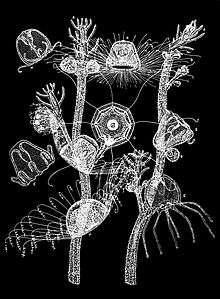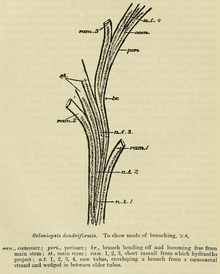Oceaniidae
Oceaniidae is one of the over 50 cnidarian families of the order Anthomedusae. It contains nearly 50 species in ten genera.[1]
| Oceaniidae | |
|---|---|
 | |
| Turritopsis life cycle. Two branches from the tree-like colony are shown, with a feeding hydra (A) the tip of each twig. Buds at the base of the hydra (at B) eventually detach and grow into adult jellyfish (K) | |
| Scientific classification | |
| Kingdom: | Animalia |
| Phylum: | Cnidaria |
| Class: | Hydrozoa |
| Order: | Anthoathecata |
| Suborder: | Filifera |
| Family: | Oceaniidae Eschscholtz, 1829[1] |
| Diversity | |
| 9 or 10 genera, 40+ species | |
Genera
- Corydendrium (11 species)
- Corystolona (monotypic)
- Merona (5 species)
- Oceania (6 species)
- Pachycordyle (disputed)
- Rhizogeton (7 species)
- Similomerona (monotypic)
- Tubiclava (5 species)
- Turritopsis (11 species)
- Turritopsoides (monotypic)

Corydendrium parasiticum, Stalk section of colony showing branching pattern, magnification × 8. br. = branch, coen. = coenosarc, n.t.1/2/3/4 = new tubes enveloping a branch from a coenosarcal strand and wedged in between older tubes, peri. = perisarc, ram.1/2/3 = short bearing hydranths, st. = stem.
gollark: Really, relying on these arbitrary divisions in the first place is stupid.
gollark: No, I mean it could give one or the other a non-population-related advantage due to differences in the geometry of some kind.
gollark: I guess it's possible that even one which doesn't know about parties might accidentally be biased due to (hypothetically, I don't know if this is true) one party being popular in low-density areas and the other in high-density, or really any other difference in locations.
gollark: You don't actually need simple shapes very badly as long as you have an algorithm which is not likely to be biased.
gollark: Okay, rearrange the states so they're square.
References
- Peter Schuchert (2012). Schuchert P (ed.). "Oceaniidae". World Hydrozoa database. World Register of Marine Species. Retrieved November 29, 2012.
This article is issued from Wikipedia. The text is licensed under Creative Commons - Attribution - Sharealike. Additional terms may apply for the media files.